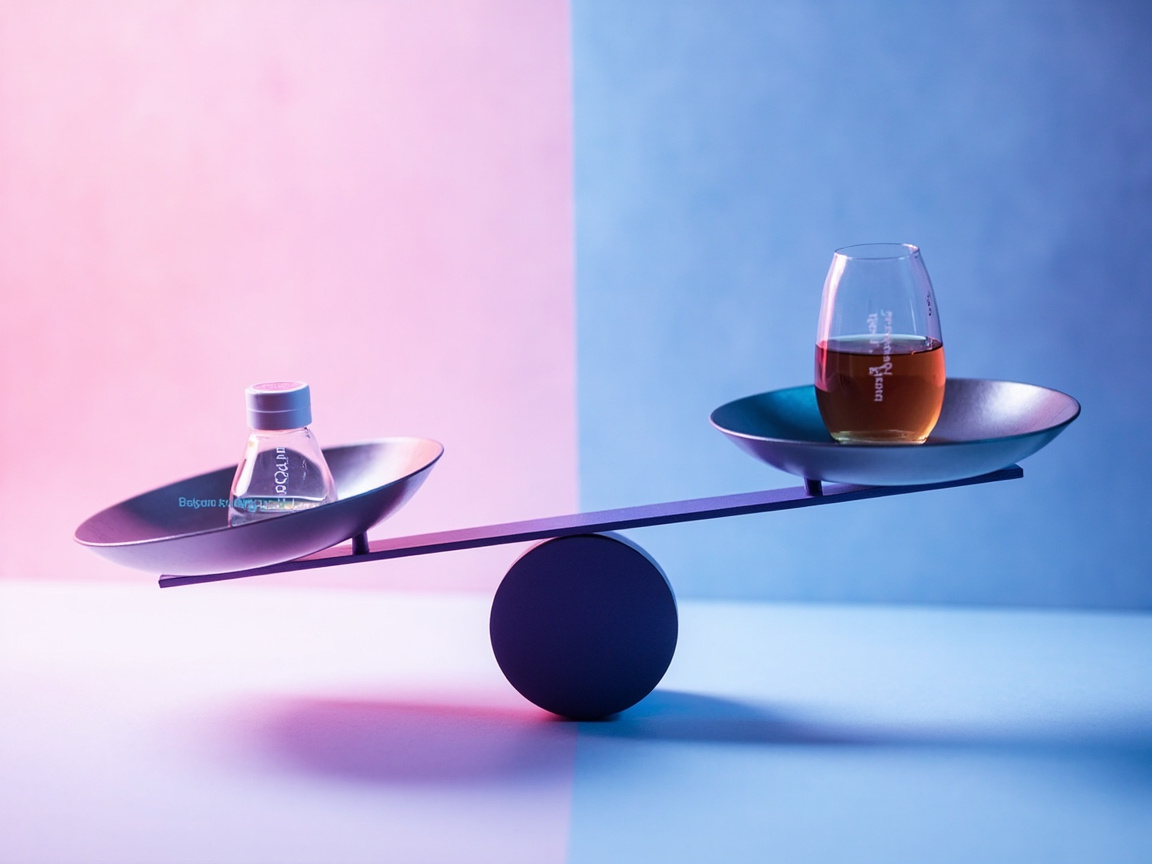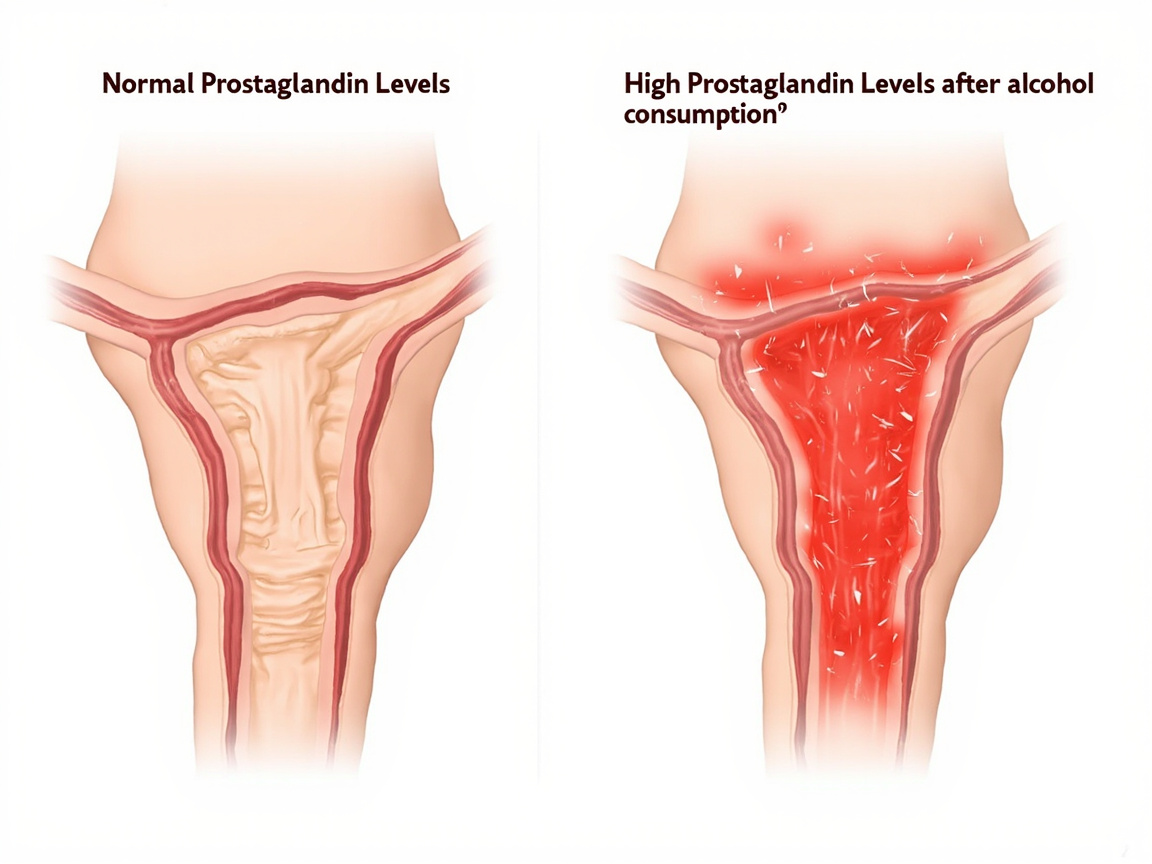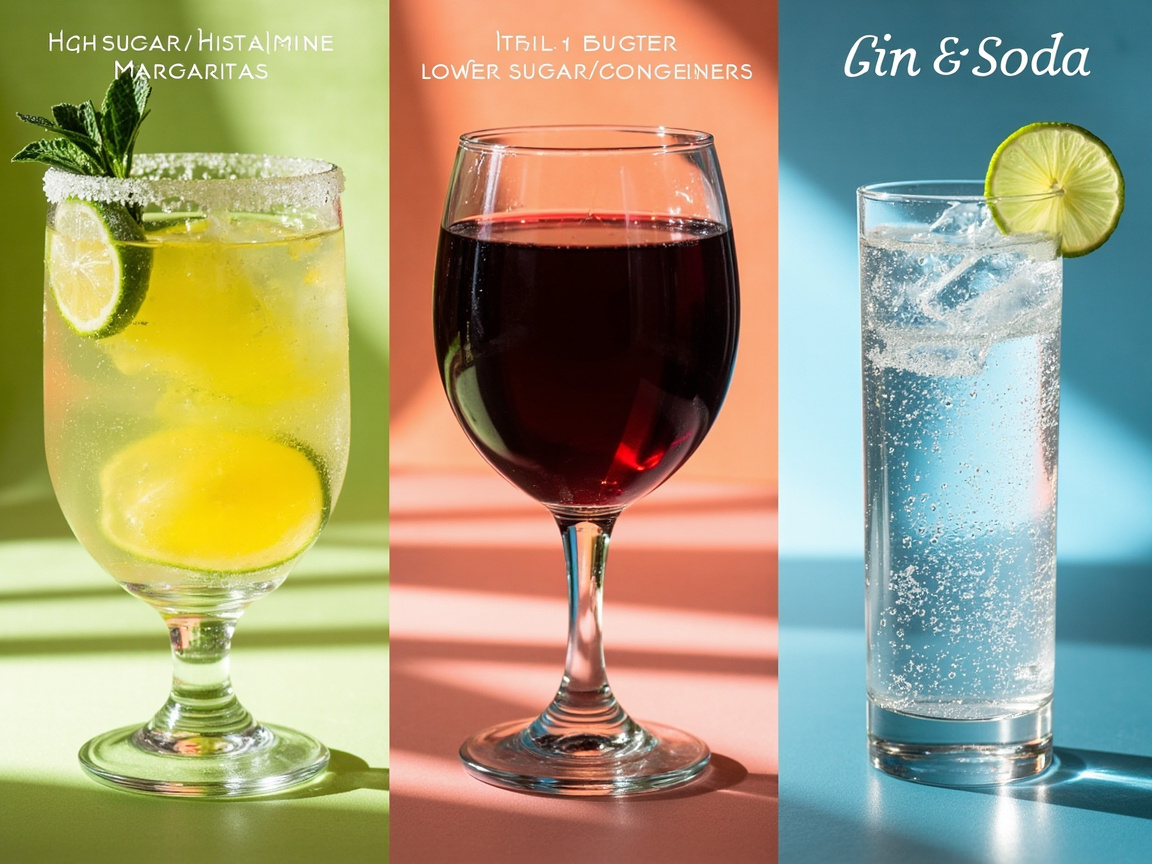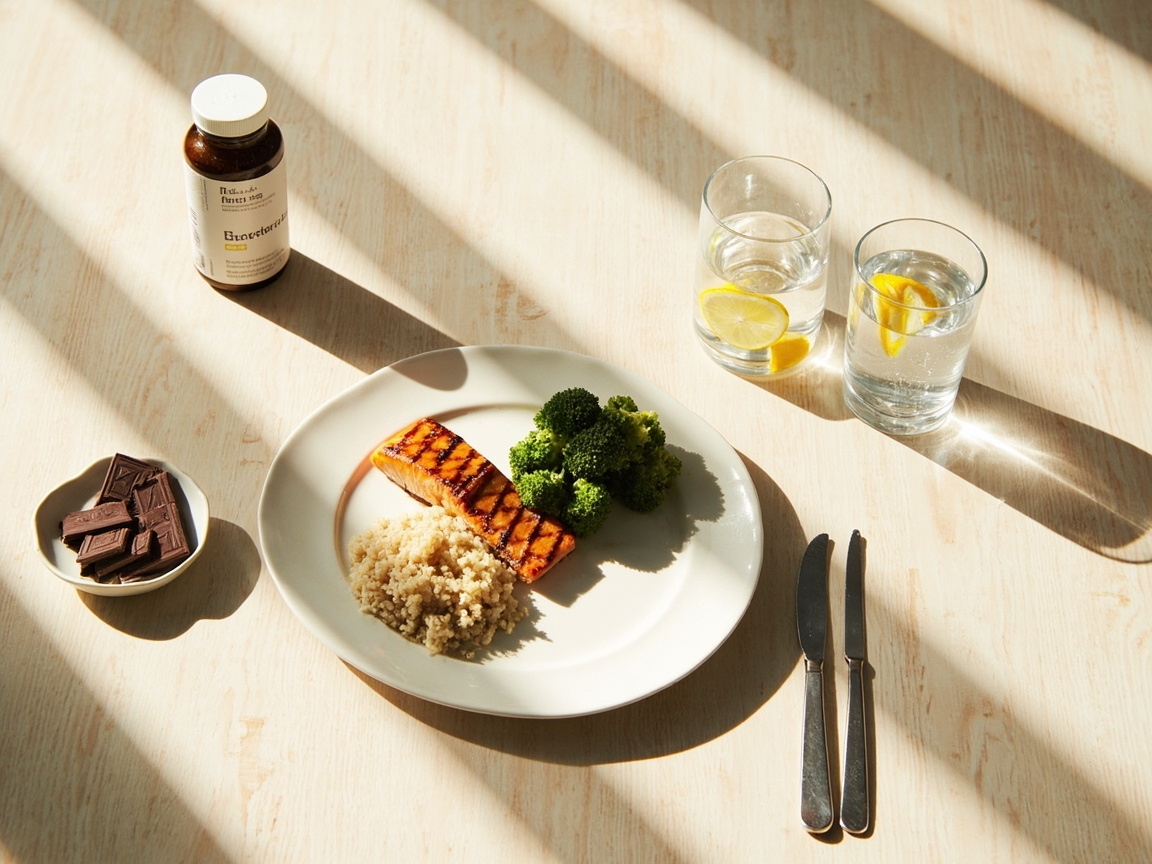
My goal here is to cut through that noise. Having a background in textile engineering taught me to look at the science, and my time as an athlete taught me to listen to my body. This guide is about moving beyond a simple "yes" or "no" to give you an evidence-based understanding of the intricate dance between alcohol and your menstrual cycle. This isn't about judgment or restriction; it's about empowerment. By the end, you'll have the clarity and confidence to make informed choices that honor your body and support your hormonal health—not just during your period, but throughout your entire cycle.
Key Takeaways
- Hormonal Disruption: Alcohol can interfere with your liver's ability to process estrogen and may disrupt the delicate hormonal balance crucial for a smooth cycle, potentially worsening PMS symptoms like mood swings and bloating.
- Nutrient Depletion: Alcohol acts as an anti-nutrient, depleting essential minerals and vitamins for menstrual health, particularly magnesium (the "anti-cramp" mineral) and B vitamins (critical for energy and mood).
- Inflammation and Pain: Because it's inflammatory, alcohol can increase the production of prostaglandins that cause uterine contractions, which may significantly worsen period cramps.
- Timing Is Everything: Your sensitivity to alcohol varies throughout your cycle. The luteal phase (the 1-2 weeks before your period) is when you are most vulnerable to alcohol's negative effects on PMS symptoms.
The Science Simplified: How Alcohol Disrupts Your Menstrual Cycle
To understand the real alcohol and periods effects, we need to look under the hood at the biochemistry. Your menstrual cycle is a finely tuned symphony conducted by your hormones. When you introduce alcohol, it’s like an uninvited, boisterous guest who starts messing with the soundboard, turning dials, and unplugging essential instruments. The result can range from mild dissonance to a full-blown cacophony of symptoms. Let's break down exactly what's happening.
The Hormonal Rollercoaster: Alcohol's Impact on Estrogen and Progesterone
Your liver is your body's master detoxification organ, and it plays a critical role in metabolizing and clearing hormones, particularly estrogen. When you consume alcohol, your liver prioritizes metabolizing it above all else. This makes sense from a survival perspective—alcohol is a toxin. However, this means its other crucial jobs, like processing used-up estrogen, get put on the back burner.
This delay can lead to a temporary increase in circulating estrogen levels. As a study highlighted by the National Institute on Alcohol Abuse and Alcoholism (NIAAA) explains, alcohol consumption can indeed cause a rise in estrogen levels. For women who are already prone to high estrogen or "estrogen dominance," this can be particularly problematic. This excess estrogen can contribute to a host of unpleasant symptoms, especially in the week or two before your period (the luteal phase), including:
- Breast tenderness and swelling
- Increased bloating and water retention
- Irritability and mood swings
- Heavier, more painful periods
Furthermore, alcohol can also suppress progesterone levels. Progesterone is the calming, balancing hormone that rises after ovulation. It helps to offset estrogen's proliferative effects and supports a stable mood. When alcohol interferes with this delicate estrogen-progesterone balance, the impacts of alcohol on periods become much more pronounced, often leading to more severe PMS symptoms.

Myth vs. Reality
Myth: "A glass of wine helps with cramps."
Reality: This is one of the most persistent myths I encounter. While alcohol might offer a fleeting muscle-relaxing effect, it's a short-term illusion. As a former elite athlete, I learned that true performance comes from reducing inflammation, not masking it. Alcohol is fundamentally inflammatory. It increases the very prostaglandins that cause painful cramps, dehydrates you, and depletes magnesium—all of which worsen pain. The delayed inflammatory rebound almost always outweighs any brief relief, making a warm bath or a magnesium supplement a far more effective strategy.
Nutrient Depletion: The Hidden Cost of a Cocktail
One of the most overlooked alcohol effects on the menstrual cycle is its impact on your micronutrient status. Effectively, alcohol acts as an anti-nutrient, meaning it can interfere with the absorption and increase the excretion of several vitamins and minerals that are absolutely essential for a healthy period.
The key players here include Magnesium, B vitamins, and Zinc.
- Magnesium: I call magnesium the "great relaxer." It's a mineral that helps to relax smooth muscle tissue, including the uterine muscle, making it crucial for easing menstrual cramps. It also plays a role in regulating the nervous system and supporting mood. Frustratingly, alcohol consumption causes your kidneys to excrete magnesium at an accelerated rate. So, that glass of wine you're having to "relax" might actually be depleting the very nutrient your body needs to physically relax your cramping uterus.
- B Vitamins (Especially B6 and Folate): Think of the B-complex vitamins as the spark plugs for your energy and mood. Vitamin B6 is particularly important for producing mood-regulating neurotransmitters like serotonin and dopamine, and it also helps your liver process estrogen. Alcohol inhibits the absorption of these vital B vitamins, which can contribute to PMS-related fatigue, low mood, and brain fog.
- Zinc: This mineral is vital for ovulation, immune function, and regulating the body's inflammatory response. Alcohol consumption can impair zinc absorption and increase its loss, potentially impacting cycle regularity.
When these nutrients are low, your body's ability to cope with the natural inflammatory and hormonal shifts of your cycle is significantly impaired. This is a key reason why addressing drinking alcohol during period symptoms can feel like you're pouring fuel on a fire.
Inflammation and Pain: Can Alcohol Worsen Period Cramps?
This is the million-dollar question for many women, and the short answer is a resounding yes. Menstrual cramps (dysmenorrhea) are primarily caused by hormone-like substances called prostaglandins. Some prostaglandins are inflammatory and cause the uterus to contract forcefully to shed its lining, leading to pain. A healthy balance is key.
Alcohol, especially when consumed in excess, promotes systemic inflammation. It can increase the production of the inflammatory type of prostaglandins, leading to more intense and prolonged uterine contractions. As the Cleveland Clinic notes, this inflammatory response can make your period cramps feel significantly worse. So while you might feel a temporary sense of relief from alcohol's initial effects, the rebound inflammatory effect a few hours later, or the next day, can leave you in more pain than when you started.

Dehydration and Bloating: The Uncomfortable Duo
Have you ever noticed that you feel extra puffy and bloated after a night of drinking, especially around your period? This isn't your imagination. Alcohol is a diuretic, meaning it makes you urinate more frequently, leading to dehydration.
When your body senses dehydration, it goes into survival mode and starts holding onto every drop of water it can. This leads to water retention and bloating. This effect is compounded by the fact that many women already experience hormonal bloating in the days leading up to their period. Alcohol adds another layer of fluid retention on top of this, creating that uncomfortable, swollen feeling. Dehydration is also a major trigger for headaches and fatigue, two other common complaints during menstruation.
Drinking and Your Cycle: A Phase-by-Phase Guide
Your hormonal landscape changes dramatically throughout your cycle, and so does your body's ability to tolerate alcohol. Understanding these phases is key to making smart choices and minimizing negative PMS symptoms alcohol might trigger. Think of it as your strategic map for navigating social drinking.
| Menstrual Phase | Typical Days | Hormonal State & Alcohol Tolerance | Key Recommendation |
|---|---|---|---|
| Menstruation | 1-7 | Hormones are low; body is in an inflammatory state. Sensitivity to alcohol is high and it can worsen cramps, fatigue, and dehydration. | Minimize or avoid. Prioritize rest and hydration. |
| Follicular Phase | 8-13 | Estrogen is rising; energy and mood are typically high. The body is more resilient and metabolizes alcohol more efficiently. | The most "forgiving" window. Moderate consumption is better tolerated. |
| Ovulation | ~14 | Estrogen and LH surge. This is a delicate hormonal event. Heavy drinking can potentially disrupt ovulation signals. | Be mindful. Avoid heavy drinking, especially if trying to conceive. |
| Luteal Phase | 15-28 | Progesterone rises, then both hormones fall, triggering PMS. This is the most vulnerable phase for mood swings, bloating, and poor sleep. | Ideal time to reduce or eliminate alcohol to minimize PMS. |
Debunking Common Myths About Alcohol and Your Period
The internet is filled with old wives' tales about drinking on your period. Let's use science to set the record straight.
Myth: "It Doesn't Matter What Kind of Alcohol You Drink."
The Verdict: False.
While all alcohol is ethanol and is processed by the liver similarly, the full package matters a great deal.
- Sugary Mixers: Cocktails made with juice, soda, or sugary syrups deliver a double whammy. The sugar causes a spike in your blood sugar and insulin, which is another inflammatory trigger that can worsen mood swings and energy crashes.
- Congeners: Darker liquors like whiskey, brandy, and red wine contain higher levels of congeners. These are byproducts of fermentation that can contribute to more severe hangovers and inflammatory reactions in sensitive individuals. Clear liquors like vodka and gin are generally lower in congeners.
- Histamine and Sulfites: Red wine, in particular, can be high in histamines, which can trigger headaches and flushing in sensitive people.
If you are going to drink, opting for a clear spirit mixed with sparkling water and a squeeze of lime is often a better-tolerated choice.

Practical Strategies for Mindful Drinking and Menstrual Wellness
My philosophy is rooted in empowerment, not deprivation. The goal is to equip you with strategies to live your life while also feeling your best. It's about shifting from mindless consumption to intentional choices that align with your health goals.
Know Your "Why": Intentional vs. Habitual Drinking
Before you reach for a drink, take a moment for a gentle check-in. Ask yourself: "Why do I want this drink right now?"
- Am I drinking to genuinely savor the taste and enhance a social experience?
- Or am I drinking to numb stress, anxiety, or period pain?
- Could I be drinking out of habit or social pressure?
There's no wrong answer, but awareness is power. If you find you're consistently using alcohol as a crutch for stress, it might be a sign to explore more supportive coping mechanisms, like a short walk, meditation, or talking with a friend.

Smart Swaps and Healthier Alternatives
Building a toolkit of delicious and satisfying non-alcoholic options can be a game-changer. It ensures you never feel like you're "missing out."
- Elevate Your Mocktail Game: Muddle fresh mint and lime with sparkling water for a mojito vibe. Blend frozen berries with a splash of kombucha for a fizzy, probiotic-rich treat.
- Explore Herbal Teas: Peppermint and ginger are fantastic for digestion. Chamomile is calming before bed. Raspberry leaf tea is a classic uterine tonic that can help ease cramps.
-
If You Do Drink, Drink Smarter:
- Hydrate First: Have a large glass of water before your alcoholic beverage.
- Alternate: For every alcoholic drink, have a glass of water or sparkling water.
- Ditch the Sugar: Opt for spirits with soda/tonic and fresh citrus.
The Power of Tracking: Become Your Body's Detective
Knowledge is power. Tracking your cycle and habits is the single most effective way to understand your unique physiology. For one or two months, note your cycle day, symptoms (rate cramps, mood, etc., on a scale of 1-10), and alcohol intake. At the end of the month, you'll have a personalized roadmap showing you exactly how alcohol influences your well-being. This approach to understanding your menstrual cycle health is truly transformative.
Supporting Your Body: Nutritional and Lifestyle Buffers
If you know you'll be drinking, you can be proactive about giving your body the support it needs.
- Never Drink on an Empty Stomach: Eating a balanced meal with protein, healthy fats, and fiber before you drink slows alcohol absorption.
- Replenish Key Nutrients: The day after, focus on foods rich in the nutrients alcohol depletes. Think leafy greens for magnesium, and eggs and legumes for B vitamins.
- Hydrate, Hydrate, Hydrate: Drink plenty of water before, during, and especially after. Adding electrolytes can help your body rehydrate more effectively.
- Prioritize Sleep: Do your best to get a full night's sleep, as this is when your body does most of its repair work.
- Choose Comfort: On days when you feel rundown, prioritizing comfort is key. Opting for something reliable like the Beautikini 4-Layer Leakproof Period Panties can provide peace of mind and physical ease, allowing you to focus on recovery.
As Northwestern Medicine advises, being mindful of these lifestyle factors can help mitigate some of alcohol's negative impacts. It's about creating a holistic support system for your body.

Conclusion: Empowering Your Health, One Cycle at a Time
Your menstrual cycle is not a curse; it's a vital sign—a monthly report card on your overall health. The symptoms you experience are signals, your body's way of communicating with you. The connection between alcohol and your period is a perfect example of this.
From my perspective, both as a product innovator and an athlete, knowledge is the ultimate performance enhancer. I encourage you to become an investigator of your own body. Use this information to experiment, to track, to listen, and to find what truly works for you. Whether that means saving that glass of wine for the first half of your cycle or discovering a new favorite mocktail, you are in the driver's seat.
Making these conscious shifts can have a ripple effect, improving not only your period but your energy, mood, and overall vitality. You have the power to transform your relationship with your cycle from one of dread to one of harmony. If you found this guide helpful and are ready to continue your journey toward hormonal balance, I invite you to explore more of our resources. Here's to your health and confidence, one empowered choice at a time.
Frequently Asked Questions
Q1: Can drinking alcohol stop or delay your period?
While moderate drinking is unlikely to halt a period, chronic heavy drinking can disrupt the hormonal signals that regulate your cycle. This can potentially lead to irregular cycles, delayed periods, or even anovulation (a cycle without ovulation). The stress on the body from a single night of heavy drinking could also theoretically cause a short delay for some individuals.
Q2: How much alcohol is 'safe' during the menstrual cycle?
There is no universal 'safe' amount, as individual tolerance varies greatly based on genetics, lifestyle, and overall health. A good harm-reduction strategy is to be most cautious during your luteal phase and period. For many women, limiting intake to 1-3 drinks per week and avoiding them in the 7-10 days before their period starts can significantly reduce negative symptoms.
Q3: Will quitting alcohol completely improve my period symptoms?
For many women, absolutely. Reducing or eliminating alcohol can lead to significant improvements by lowering inflammation, helping balance hormones, restoring nutrient levels, and promoting better sleep. In my experience, many report lighter, less painful periods, more stable moods, and reduced bloating after cutting back on alcohol.
Q4: Why do I get drunk faster right before my period?
This is a very common experience! Hormonal fluctuations during the luteal phase, especially changes in estrogen and progesterone, can affect liver enzyme activity and how you metabolize alcohol. Additionally, if you're already feeling fatigued or dehydrated due to PMS, alcohol's effects can feel much stronger and hit you more quickly. It's a clear sign from your body to be more mindful during this phase.
Q5: Can alcohol cause spotting between periods?
Yes, it's possible. By disrupting the delicate balance between estrogen and progesterone, alcohol can sometimes contribute to irregular bleeding or spotting between periods, especially if consumption is heavy or inconsistent. Think of it as a signal that your hormonal rhythm is being affected.
Q6: What are the best drinks to choose if I decide to have alcohol?
If you choose to drink, opt for clearer spirits like vodka or gin mixed with sparkling water and a squeeze of fresh citrus. These options are lower in inflammatory compounds called congeners and avoid the added sugar found in many cocktails, juices, or sodas. Red wine and dark liquors, while fine for some, can be higher in congeners and histamines, which may worsen symptoms for sensitive individuals.
Q7: Are there any alternatives to alcohol for relaxing during my period?
Definitely! Exploring other relaxation methods can be a game-changer. Try a warm bath with Epsom salts (rich in magnesium), sipping on herbal teas like chamomile or raspberry leaf, gentle stretching or yoga, or meditating with a guided app. These activities support your body's natural relaxation response without the negative side effects of alcohol.















